What We All Long For by Dionne Brand
Dionne Brand’s 2005 novel What We All Long For explores the experiences of a small group of friends in Toronto and their troubled family histories, in particular touching on how processes and forces of global travel, nationalism, culture, racialization, and economic disparities inform their identities. This set of stories interweave with the story of one lost family member, Quy, who struggles to rejoin his family through an international maze of barriers.
The Jade Peony by Wayson Choy
Wayson Choy’s novel follows a Chinese Canadian family in Vancouver around the time of World War II, through the eyes of the three youngest children. The story draws on the history of Chinese labourers on the railway, the perpetual navigations of and tensions caused by cultural difference, perceptions of Japanese Canadians, and other national and cultural identifications dominant at the time.
Funny Boy by Shyam Selvadurai
Shyam Selvadurai’s novel Funny Boy presents the coming of age of Arjie, a young, gay, Tamil boy in Sri Lanka. Set against the backdrop of Sri Lankan social and cultural politics of the 1980s, the novel explores the barriers around love, marriage, gender expectations, and cultural tensions, specifically in the Sinhala and Tamil populations. The tension and change in Sri Lanka during the 1980s leading up to the events of Black July parallel the development of Arjie’s own tumultuous realization of his homosexual identity.
The Wars by Timothy Findley
The Wars, which won the Governor General’s Award for Fiction in 1977, is an example of what influential Canadian literature critic and theorist Linda Hutcheon terms historiographic metafiction.
Goodnight Desdemona (Good Morning Juliet) by Ann-Marie MacDonald
Ann-Marie MacDonald’s widely produced play, and winner of the 1990 Governor General’s Award for Drama, presents Constance Ledbelly, an academic who is sucked into and disrupts the story-worlds of two Shakespearean plays, Othello and Romeo and Juliet.
Ana Historic by Daphne Marlatt
Influenced by both avant-garde poetry and Virginia Woolf’s stream of consciousness narrative mode, Daphne Marlatt’s Ana Historic follows the mind of the narrator, Annie, at work. While researching the history of Mrs. Richards, a mysterious woman who appears in the civic archives of Vancouver in 1873, Annie’s mind jumps from her research to her personal struggle with her mother’s suicide, intermingling the three women’s stories on the page. The layout and typography change as perspective shifts, offering a collage of the women’s lives, serving as analogues to one another.
Roughing It in the Bush by Susanna Moodie
This popular account of emigration from England and settlement in Upper Canada has become a classic in the history of Canadian literature. First published in 1852, Roughing It in the Bush describes Susanna Moodie’s impressions of the people, places, and processes of settlement in the first seven years after she arrived in Upper Canada in 1832.
Swamp Angel by Ethel Wilson
Considered one of Wilson’s most accomplished works, Swamp Angelfollows Maggie Vardoe (later Lloyd) as she flees her husband in Vancouver to help run a fishing lodge in the interior of British Columbia. The novel illustrates the tension between her personal autonomy as a woman, and the needs and perceptions of a largely heteronormative community. Through the transformations of the main character, we can observe a process of attaining personal agency and self-actualization in the midst of societal constraints.
Shifting Representation: Ronnie the Bren Gun Girl
Despite the hyper-masculinity of early to mid-twentieth century modernism, representations of gendered spaces and relationships began to shift with the World Wars, which produced the need for women to play a greater role in public life. Much of this shift was influenced by the need for women to work in factories, filling the positions traditionally held by the men now risking their lives at the front.








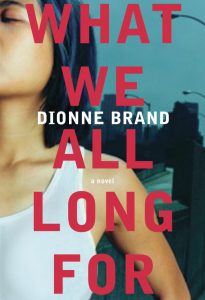
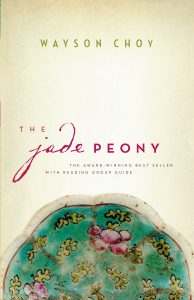
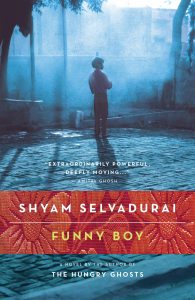
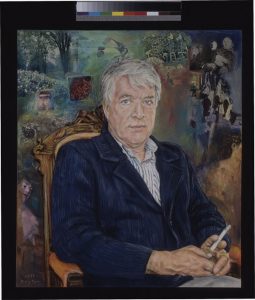
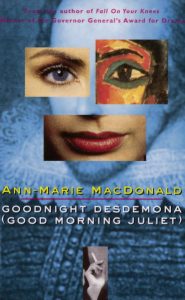
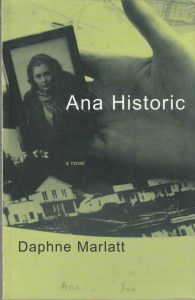
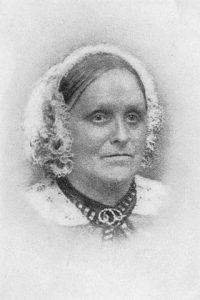
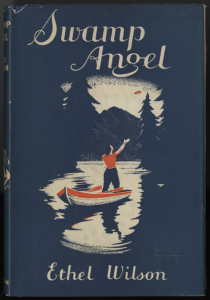
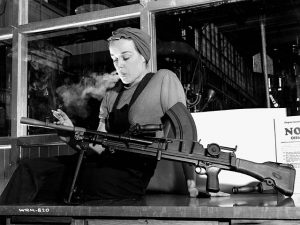
 ©
©